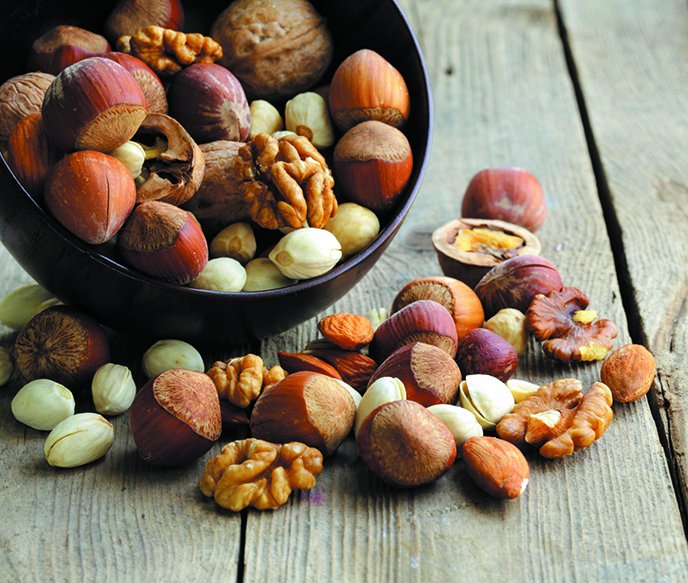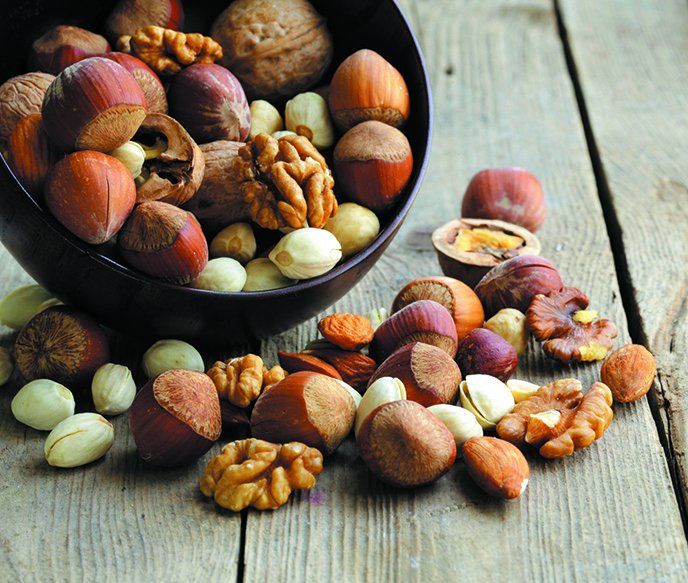At least part of the proven cardiovascular benefits of eating nuts can be explained by their effects on cholesterol and other blood lipids, according to new Tufts research. The meta-analysis of 61 controlled intervention trials totaling 2,532 participants found that tree nut intake lowered total cholesterol, LDL cholesterol, triglycerides and lipoproteins (particles that transport fats through the body). The major determinant of cholesterol lowering appeared to be nut dose rather than nut type, so you can eat your favorite nuts without worrying about nutrient differences.
“This meta-analysis provides the most comprehensive estimates to date of the effects of tree nut intake on major cardiovascular disease risk factors,” says Dariush Mozaffarian, MD, DrPH, dean of Tufts’ Friedman School and editor-in-chief of the Health & Nutrition Letter, who was a co-author on the study.
Lead author Liana C. Del Gobbo, PhD, adds, “Accumulating evidence indicates that nut intake lowers risk of cardiovascular disease events. Our findings showing that nut intake significantly improves the lipid profile provide critical mechanistic evidence to support a causal link between nut intake and lowered cardiovascular disease risk.”
NUTRIENT POWERHOUSES: Researchers from Tufts and the Life Sciences Research Organization combed through more than 1,300 prior clinical trials to identify those most relevant to nuts’ lipid effects. Average age of participants in the 61 selected studies was 45; two-thirds of the trials included both men and women. The International Tree Nut Council provided funding for the review but played no role in data collection, analysis or publication, which was in the American Journal of Clinical Nutrition.
The most-studied nuts in the trials were almonds and walnuts, but included studies also involving pistachios, macadamia nuts, pecans, cashews, hazelnuts and Brazil nuts. Peanuts, a legume rather than a true tree nut, were not included; other research, however, has shown that eating peanuts has comparable effects to consuming tree nuts, and peanuts’ nutrient profile is similar.
“Tree nuts are rich in unsaturated fats, soluble fiber, antioxidants and phytosterols,” the researchers noted. “Prior meta-analyses of controlled trials have shown that tree nut intake lowers total and LDL cholesterol.” Those earlier reviews did not look at other cardiovascular disease factors, however, and two considered only walnuts or almonds.

IMAGE © THINKSTOCK
HOW MUCH?: Combining results from all 61 trials and adjusting for a standard serving of 28 grams (about one ounce), researchers found that one daily serving reduced total cholesterol by 4.7 mg/dL and unhealthy LDL cholesterol by 4.8 mg/dL compared to control groups. Alipoprotein B (ApoB) and triglycerides were also reduced, although the latter effect was small. The improvement in ApoB was stronger among participants with type 2 diabetes. No effects were seen for good HDL cholesterol, other lipoproteins or blood pressure.
But lipid improvements might not tell the whole story of nuts and your heart health. The effects of one daily serving of tree nuts on LDL cholesterol and ApoB, when translated to predicted benefits against cardiovascular disease, still fell short of the reductions seen in other studies of nuts and cardiovascular risk. Researchers said this suggests that tree nuts have additional cardiovascular benefits beyond LDL cholesterol and ApoB lowering. These likely include improvements in blood glucose and blood-vessel function.
GOING NUTS: Dr. Mozaffarian notes that substantial other evidence, published in the last few years, suggests that people can add nuts to their diets with or without paying attention to substituting them for other sources of calories. “In meta-analysis of randomized controlled trials, there is no weight gain whether or not substitution is recommended,” he says. “In the long-term PREDIMED trial, there was no weight gain (and actually some weight loss) when free tree nuts were added to the diet. In long-term observational studies, increasing nut intake is linked to lower weight gain.
“These findings together indicate that our natural physiologic mechanisms compensate very well for these calories,” Dr. Mozaffarian goes on, “and indeed that the nutritional composition and qualities of nuts actually help this compensation.”
As this study shows, moreover, you can choose whatever nuts you prefer. A variety of nuts may be even better as a way of making sure you’re getting all the healthy nutrients tucked inside these little shells.
TO LEARN MORE: American Journal of Clinical Nutrition, December 2015 —
http://ajcn.nutrition.org/content/102/6/1347.abstract?etoc
You can eat nutritious nuts all through the day, from breakfast through dinner. Here are some ideas:
– Top oatmeal with chopped nuts.
– Include nuts in homemade granola.
– Use nuts in salad instead of croutons or cheese.
– Sprinkle nuts on yogurt for a snack or dessert.
– Use nuts to add crunch to whole-grain or vegetable dishes.
– Combine nuts with herbs such as basil or parsley to make pesto.
– Add nuts to stir-fry entrées.





















